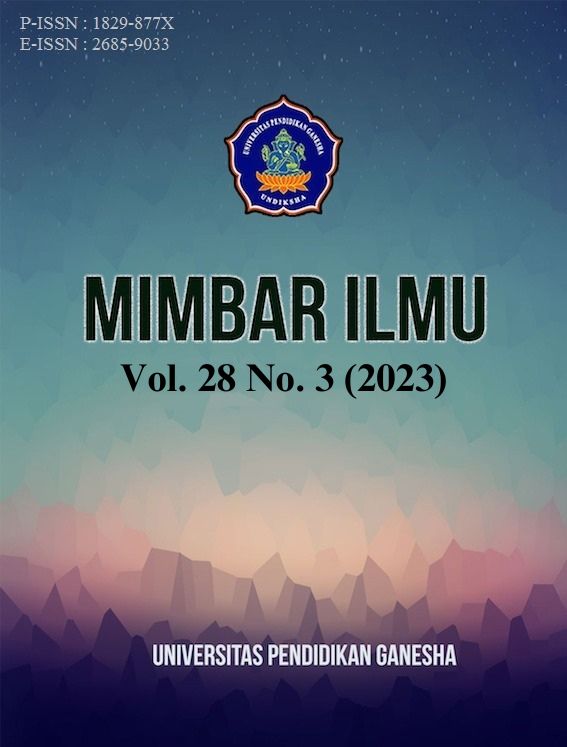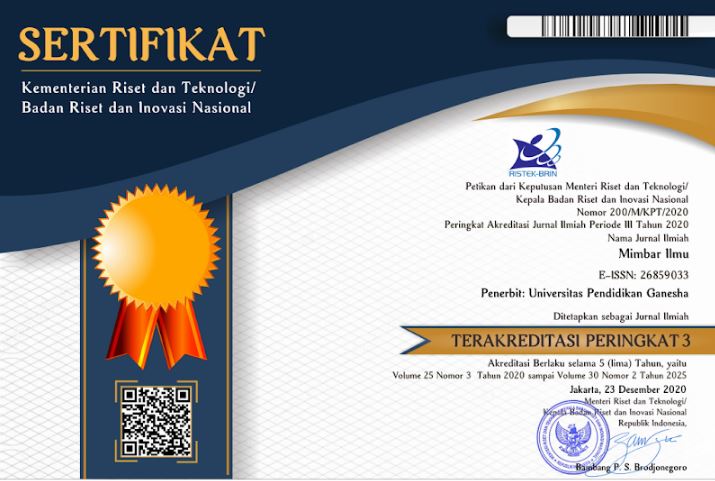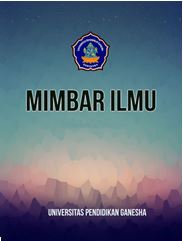Improving Students' Collaboration Ability and Scientific Literacy through the Group Investigation Type Cooperative Learning Model
DOI:
https://doi.org/10.23887/mi.v28i3.65168Kata Kunci:
Group Investigation (GI), Collaboration Skills, Scientific LiteracyAbstrak
Many factors influence scientific literacy, including students' lack of activeness and interest in reading in the learning process. Based on the observations, it was found that students' collaboration abilities still needed to be higher, with a percentage of 60% not understanding collaboration. This is because students are less active in communicating and interacting, and the learning model applied by teachers needs to be more creative and innovative. This research examines the effect of the Group Investigation (GI) type cooperative learning model on the collaboration abilities and scientific literacy of fifth-grade elementary school students. The type of research carried out was experimental research, with a nonequivalent pre-test and post-test control group design. The population of this study was 133 students. The sample in this study involved 19 students in the experimental class and 18 students in the control class. Collaboration ability data was collected using questionnaire instruments and test instruments in the form of objective questions for scientific literacy. Next, the data was analyzed using descriptive and inferential statistical techniques (t-test and Manova). Based on the t-test analysis, it was found that simultaneously, the GI-type cooperative learning model influenced students' collaboration abilities and scientific literacy. Based on descriptive analysis, the average score of the experimental group was more significant than the average score of the control group. The GI type cooperative learning model influences collaboration skills and scientific literacy.
Referensi
Aldriani, S. N. F., Chitta, F., Zulfikar, M. R., & Mardhiyah, R. H. (2021). Pentingnya Keterampilan Belajar di Abad 21 sebagai Tuntutan dalam Pengembangan Sumber Daya Manusia. Lectura : Jurnal Pendidikan, 12(1), 29–40. https://doi.org/10.31849/lectura.v12i1.5813. DOI: https://doi.org/10.31849/lectura.v12i1.5813
Alfaeni, D., Nurkanti, M., & Halimah, M. (2022). Kemampuan Kolaborasi Siswa Melalui Model Project Based Learning Menggunakan Zoom Pada Materi Ekosistem. Bioedukasi (Jurnal Pendidikan Biologi), 13(2), 143. https://doi.org/10.24127/bioedukasi.v13i2.6330. DOI: https://doi.org/10.24127/bioedukasi.v13i2.6330
Amir, A., Azmin, N., Rubianti, I., & Olahairullah. (2021). Meningkatkan Motivasi Dan Hasil Belajar Siswa Melalui Model Pembelaran Index Card Match Pada Pelajaran IPA Terpadu Jurnal PIPA: Pendidikan Ilmu Pengetahuan Alam. Jurnal PIPA: Pendidikan Ilmu Pengetahuan Alam, 02(01), 1–6. https://jurnal.habi.ac.id/index.php/JP-IPA/article/view/48. DOI: https://doi.org/10.56842/jp-ipa.v2i01.48
Arinda, Y., Wilujeng, İ., & Kuswanto, H. (2019). The Application Group Investigation (GI) Learning Model assisted Phet to Facilitate Student Scientific Work Skills. International Journal of Educational Research Review, 4(2), 254–261. https://doi.org/10.24331/ijere.518069. DOI: https://doi.org/10.24331/ijere.518069
Ariyanto, S. R., & Muslim, S. (2019). Peningkatan Keterampilan Kolaborasi Siswa SMK Melalui Implementasi Pembelajaran Kooperatif Tipe Group Investigation. Jurnal Vokasi Teknik Otomotif, 1(1), 25–33. https://www.researchgate.net/publication/340844202.
Buaton, R. A., Sitepu, A., & Tanjung, D. S. (2021). Pengaruh Model Pembelajaran Kooperatif Tipe Group Investigation terhadap Hasil Belajar Siswa pada Pembelajaran Tematik di Sekolah Dasar. Edukatif : Jurnal Ilmu Pendidikan, 3(6), 4066–4074. https://doi.org/10.31004/edukatif.v3i6.1398. DOI: https://doi.org/10.31004/edukatif.v3i6.1398
Dewi, K. P. K., & Parmiti, D. P. (2022). Dampak Model Two Stay Two Stray terhadap Keterampilan Kolaborasi dan Hasil Belajar IPS Kelas V. MIMBAR PGSD Undiksha, 10(1), 33–38. https://doi.org/10.23887/jjpgsd.v10i1.43362. DOI: https://doi.org/10.23887/jjpgsd.v10i1.43362
Hakim, M. S. H. I. (2020). Implementasi Kolaborasi Orang Tua dan Guru Dalam Pelaksanaan Pembelajaran Daring pada PAUD. JIEES : Journal of Islamic Education at Elementary School, 1(1), 26–33. https://doi.org/10.47400/jiees.v1i1.8. DOI: https://doi.org/10.47400/jiees.v1i1.8
Harahap, D. G. S., Nasution, F., Nst, E. S., & Sormin, S. A. (2022). Analisis Kemampuan Literasi Siswa Sekolah Dasar. Jurnal Basicedu, 6(2), 2089–2098. https://doi.org/10.31004/basicedu.v6i2.2400. DOI: https://doi.org/10.31004/basicedu.v6i2.2400
Harepa, J. E., & Simamora, P. (2021). Pengaruh model pembelajaran kooperatif tipe group investigation (GI) terhadap pengetahuan konseptual fisika siswa. INPAFI (Inovasi Pembelajaran Fisika), 9(3). https://doi.org/10.24114/inpafi.v9i3.27788.
Hutama, P. D., Relmasira, S. C., & Hardini, A. T. A. (2019). Perbedaan Kemampuan Kolaborasi Dan Hasil Belajar Matematika Siswa Kelas 4 SD Menggunakan Model Pembelajaran Numbered Head Together Dan Teams Games Tournament. Edukatif : Jurnal Ilmu Pendidikan, 1(2), 80–87. https://doi.org/10.31004/edukatif.v1i2.11. DOI: https://doi.org/10.31004/edukatif.v1i2.11
Jalmo, T., Fitriyani, D., & Yolida, B. (2019). Penggunaan Problem Based Learning untuk Meningkatkan Keterampilan Kolaborasi dan Berpikir Tingkat Tinggi. Jurnal Bioterdidik: Wahana Ekspresi Ilmiah, 7(3), 77–87. http://jurnal.fkip.unila.ac.id/index.php/JBT/article/view/17480.
Kristyowati, R., & Purwanto, A. (2019). Pembelajaran Literasi Sains Melalui Pemanfaatan Lingkungan. Scholaria: Jurnal Pendidikan Dan Kebudayaan, 9(2), 183–191. https://doi.org/10.24246/j.js.2019.v9.i2.p183-191. DOI: https://doi.org/10.24246/j.js.2019.v9.i2.p183-191
Lengari, E., Agustika, M. P., & Sastra, G. N. (2020). Pengaruh Model Pembelajaran Group Investigation Berbantuan Media Flash Card Terhadap Kompetensi Pegetahuan Ipa. Jurnal Penelitian Dan Pengembangan Pendidikan, 4(1), 65. https://doi.org/10.23887/jppp.v4i1.25032. DOI: https://doi.org/10.23887/jppp.v4i1.25032
Matje, I. (2023). Meningkatkan Hasil Belajar IPS Sub Tema Lingkungan dan Manfaatnya melalui Model Pembelajaran Tipe Group Investigation Siswa Kelas V-B SD Negeri 24 Buton Kabupaten Buton INFO. Arus Jurnal Psikologi Dan Pendidikan (AJPP)2, 2(1). https://jurnal.ardenjaya.com/index.php/ajpp/ article/view/163.
Mawaddah, R., Triwoelandari, R., & Irfani, F. (2022). Kelayakan Lks Pembelajaran Ipa Berbasis Stem Untuk Meningkatkan Keterampilan Kolaborasi Siswa Sd/Mi. Jurnal Cakrawala Pendas, 8(1), 1–14. https://doi.org/10.31949/jcp.v8i1.1911.
Nurdin, S. (2021). Penerapan Pembelajaran Kooperatif Tipe Group Investigation Untuk Meningkatkan Keterampilan Proses Sains Siswa Kelas VI SD. Pionir: Jurnal Pendidikan, 10(2). https://jurnal.ar-raniry.ac.id/index.php/Pionir/article/view/10621/5900.
Oktaviani, R. N. (2022). Implementasi Model Pembelajaran Problem Based Learning (Pbl) Berbasis Lesson Study Untuk Meningkatkan Keterampilan Komunikasi Dan Kolaborasi Mahasiswa Pada Mata Kuliah Perencanaan Pembelajaran Di SD. ELSE (Elementary School Education Journal) : Jurnal Pendidikan Dan Pembelajaran Sekolah Dasar, 6(2), 257. https://doi.org/10.30651/else.v6i2.11095. DOI: https://doi.org/10.30651/else.v6i2.11095
Pahrurrozi, P. (2019). Penerapan Model Pembelajaran Kooperatif Group Investigasi untuk Meningkatkan Hasil Belajar dan Kemampuan Berpikir Kritis. Jurnal Penelitian Dan Pengkajian Ilmu Pendidikan: E-Saintika, 2(2), 142. https://doi.org/10.36312/e-saintika.v2i2.115. DOI: https://doi.org/10.36312/e-saintika.v2i2.115
Petriza, N., & Eliyasni, R. (2020). Peningkatan Hasil Belajar Pada Pembelajaran Tematik Terpadu Menggunakan Model Kooperatif Tipe Group Investigation di Sekolah Dasar. Jurnal Inovasi Pendidikan Dan Pembelajaran Sekolah Dasar, 4(2), 1. https://doi.org/10.24036/jippsd.v4i2.109919. DOI: https://doi.org/10.24036/jippsd.v4i2.109919
Pratami, A. Z., Suhartono, S., & Salimi, M. (2019). Penerapan model pembelajaran group investigation untuk meningkatkan hasil belajar Ilmu Pengetahuan Sosial. Harmoni Sosial: Jurnal Pendidikan IPS, 6(2), 164–174. https://doi.org/10.21831/hsjpi.v6i2.23535. DOI: https://doi.org/10.21831/hsjpi.v6i2.23535
Putra, P. G. N., Margunayasa, I. G., & Wibawa, I. M. C. (2019). Pengaruh Model Pembelajaran Kooperatif Tipe Group Investigation (GI) Berbasis Lesson Study Terhadap Penguasaan Konsep IPA. Jurnal Pedagogi Dan Pembelajaran, 1(2), 84. https://doi.org/10.23887/jp2.v1i2.19329. DOI: https://doi.org/10.23887/jp2.v1i2.19329
Ratunguri, Y., Pangalila, T., Supit, D., Assa, F. F., & Tintingo, F. A. (2022). Penerapan Model Pembelajaran Kooperatif Tipe Group Investigation Untuk Meningkatkan Hasil Belajar Ilmu Pengetahuan Alam Siswa Kelas IV SD GMIM 2 Woloan. Jurnal Pendidikan Dan Konseling, 4(6), 1349–1358. https://doi.org/10.31004/jpdk.v4i6.8577.
Rohmaya, N. (2022). Peningkatan Literasi Sains Siswa Melalui Pembelajaran IPA Berbasis Socioscientific Issues (SSI). Jurnal Pendidikan MIPA, 12(2), 107–117. https://doi.org/10.37630/jpm.v12i2.553. DOI: https://doi.org/10.37630/jpm.v12i2.553
Rusdiana, E., & Sucipto, S. (2018). Peningkatan Kemampuan Berpikir Kritis Matematis melalui Penerapan Model Cooperative Learning Tipe Group Investigation (Studi pada Siswa SMK Dr. Soetomo Surabaya). Jurnal Ilmiah Soulmath : Jurnal Edukasi Pendidikan Matematika, 6(1), 25–36. https://doi.org/10.25139/sm.v6i1.925. DOI: https://doi.org/10.25139/sm.v6i1.925
Sari, D. N. A., Rusilowati, A., & Nuswowati, M. (2017). Pengaruh Pembelajaran Berbasis Proyek terhadap Kemampuan Literasi Sains Siswa. PSEJ (Pancasakti Science Education Journal), 2(2), 114. https://doi.org/10.24905/psej.v2i2.741. DOI: https://doi.org/10.24905/psej.v2i2.741
Sumertha, I. G. (2019). Penerapan Model Pembelajaran Kooperatif Tipe Group Investigation (GI) untuk Meningkatkan Hasil Belajar IPA Siswa. Jurnal Pedagogi Dan Pembelajaran, 2(2), 195. https://doi.org/10.23887/jp2.v2i2.17908. DOI: https://doi.org/10.23887/jp2.v2i2.17908
Syaifa, H., Khairunnisa, Y., & Yulinda, R. (2023). Pengembangan Poster Digital Multimodal Sistem Pernapasan Manusia Dalam Melatih Kemampuan Literasi Sains Pada Aspek Pengetahuan Sains Peserta Didik Smp. Dalton : Jurnal Pendidikan Kimia Dan Ilmu Kimia, 6(1), 40. https://doi.org/10.31602/dl.v6i1.10459. DOI: https://doi.org/10.31602/dl.v6i1.10459
Tekad, T., & Pebriana, R. (2022). Pengaruh Model Pembelajaran Team-Based Project terhadap Keterampilan Komunikasi dan Keterampilan Kolaborasi pada Mata Kuliah Bahasa Indonesia. Jurnal PTK Dan Pendidikan, 7(2). https://doi.org/10.18592/ptk.v7i2.5445. DOI: https://doi.org/10.18592/ptk.v7i2.5445
Ulhusna, M., Putri, S. D., & Zakirman, Z. (2020). Permainan Ludo untuk Meningkatkan Keterampilan Kolaborasi Siswa dalam Pembelajaran Matematika. International Journal of Elementary Education, 4(2), 130. https://doi.org/10.23887/ijee.v4i2.23050. DOI: https://doi.org/10.23887/ijee.v4i2.23050
Wati, M. (2022). Pengaruh Model Pembelajaran Problem Based Learning Berbantuan Media Mobile Learning Terhadap Kemampuan Kolaborasi Matematika Siswa Kelas IV SD. Indonesian Journal of Educational Science (IJES), 5(1), 56–64. https://doi.org/10.31605/ijes.v5i1.1834. DOI: https://doi.org/10.31605/ijes.v5i1.1834
Widiartini, P. D. O., Made Putra, M. P., & Manuaba, I. B. S. (2019). Pengaruh Model Pembelajaran Group Investigation Berbasis Tri Hita Karana Terhadap Kompetensi Pengetahuan IPA. Jurnal Ilmiah Sekolah Dasar, 3(3), 332. https://doi.org/10.23887/jisd.v3i3.19476. DOI: https://doi.org/10.23887/jisd.v3i3.19476
Unduhan
Diterbitkan
Cara Mengutip
Terbitan
Bagian
Lisensi
Hak Cipta (c) 2023 Kadek Sonia Prayoga, I Ketut Gading, Putu Nanci Riastini

Artikel ini berlisensiCreative Commons Attribution-ShareAlike 4.0 International License.
This work is licensed under a Creative Commons Attribution-ShareAlike 4.0 International License.
Authors who publish with this journal agree to the following terms:
- Authors retain copyright and grant the journal right of first publication with the work simultaneously licensed under a Creative Commons Attribution License that allows others to share the work with an acknowledgment of the work's authorship and initial publication in this journal.
- Authors are able to enter into separate, additional contractual arrangements for the non-exclusive distribution of the journal's published version of the work (e.g., post it to an institutional repository or publish it in a book), with an acknowledgment of its initial publication in this journal.
- Authors are permitted and encouraged to post their work online (e.g., in institutional repositories or on their website) prior to and during the submission process, as it can lead to productive exchanges, as well as earlier and greater citation of published work.









